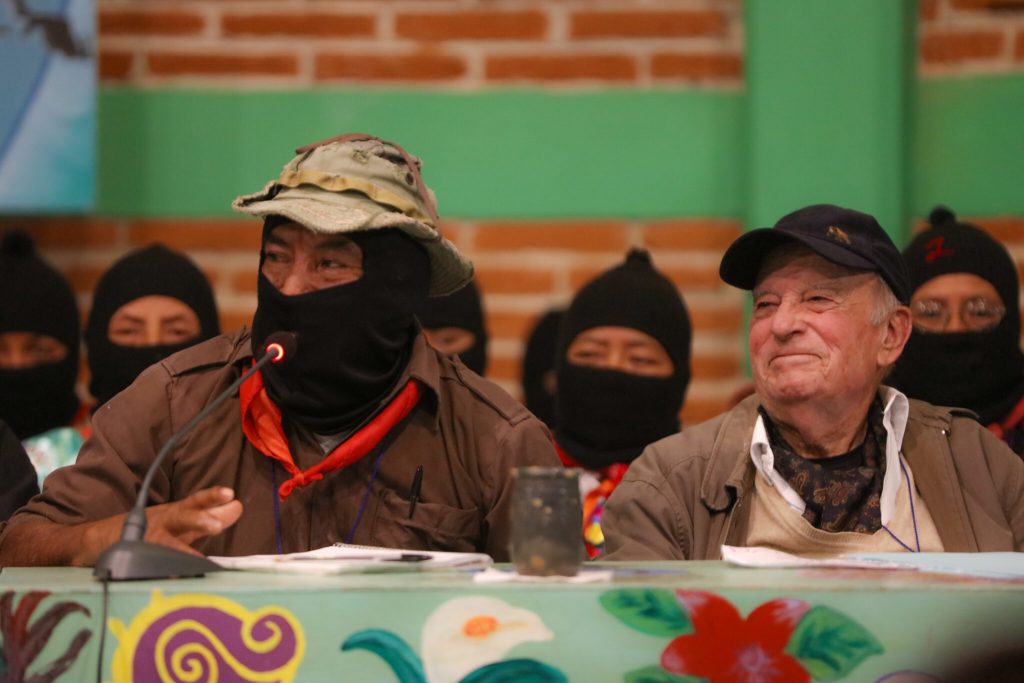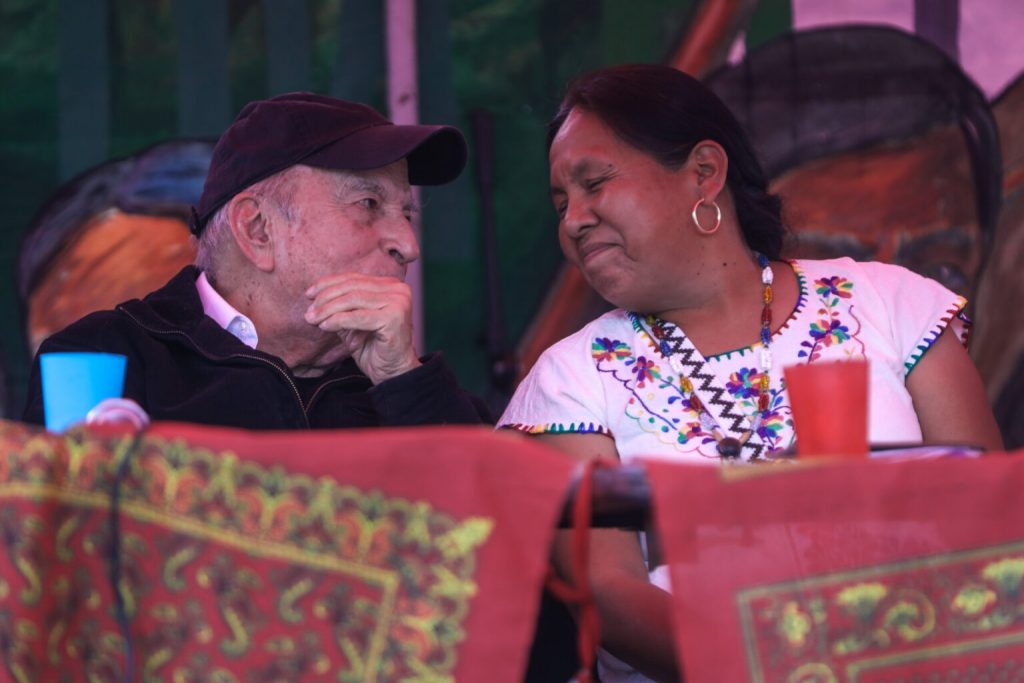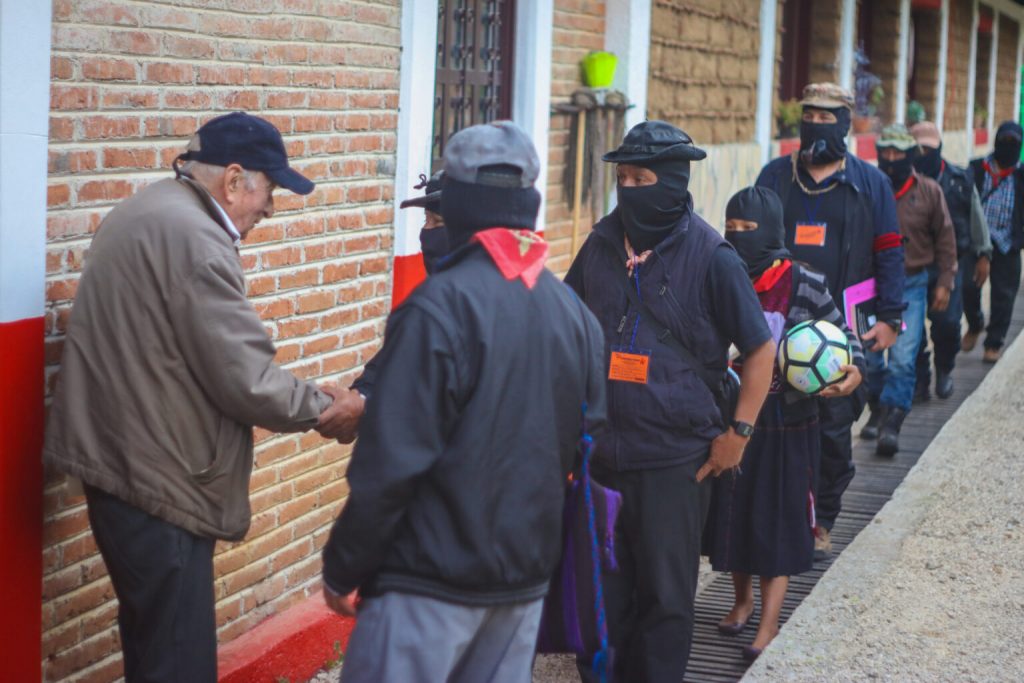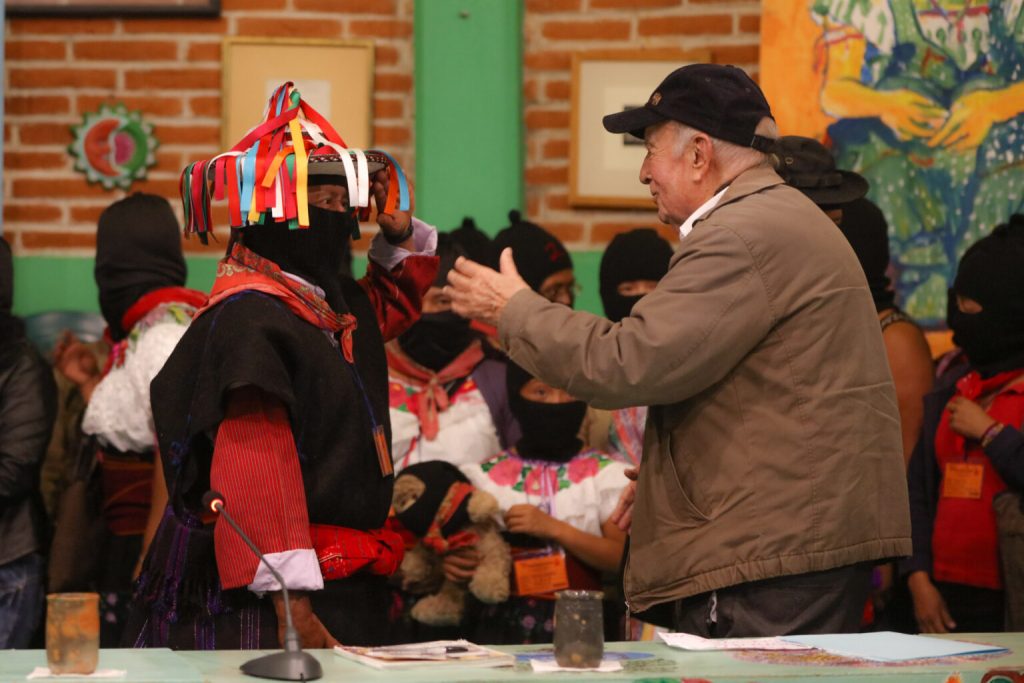
This is a journey through Pablo Gonzalez Casanova’s theoretical approach, his creations at UNAM, and his closeness to social and indigenous movements after 100 years of existence.
Text and photos: Daliri Oropeza
MEXICO CITY – Comandante Insurgente Tacho speaks into the microphone about Pablo González Casanova as the Clandestine Revolutionary Indigenous Revolutionary Committee of the EZLN names him Comandante Pablo Contreras:
“During all these years, we have seen a compañero who has not tired, who continues to have the same fighting spirit, and for whom years do not matter, he cares about the lives of our people. And that compañero has not given up, that compañero has not sold out, that compañero has not given in. On the contrary, he continues to forge the struggle among all of us and for our Mexican people.
The auditorium of the then CIDECI (Indigenous Center for Comprehensive Capacity Development), now Caracol Jacinto Canek, is full. It is the climax of the seminar “The Walls of Capital, the Cracks of the Left” convened in San Cristóbal de de las Casas in April 2018 by the Zapatista Army of National Liberation (EZLN). There is a great silence of listening in the large hall that takes in, unexpectedly, the words of the commandante.
“That compañero we call Pablo Contreras, and as Subcomandante Moisés said so well: the gift is that we are going to give him more work, (…) that we are going to continue fighting, it not that it ends here, we are going to continue fighting, and thus, that comrade is going to join this great collective, this great team, of the Clandestine Revolutionary Indigenous Clandestine Committee-General Command (CCRI-CG).”
At that moment the expectant silence broke into a long ovation. Each member of the Comandancia, from the little girl Esperanza Zapatista to the elders, raised their left hand to their foreheads in salute, and looking into his eyes to welcome, some firmly, with strength and conviction, and some with a tender embrace, the new member, who had just turned 96 years old. The salute of the commandancia was echoed and joined (by those of us there) for more than five minutes.
The subcomandante insurgente Moises had explained in a previous message in which he described how, to be part of the CCRI-CG, you don’t have to tell people how hard you work, or go from town to town campaigning. On the contrary. It is to work and for the people themselves to recognize your work and appoint you, to do more work. Without pay. To listen, to carry and share the word. To spend your birthday in the struggle.
“Those of us who are at the forefront of the struggle, it doesn’t matter to us where we spend it, the important thing is that we are doing work for the lives of our people, and that is clear to us,” said Tacho during the appointment. In that 2018 seminar, the EZLN along with the National Indigenous Congress, evaluated the process of Marichuy’s campaign, in which Don Pablo was very active from the Civil Association “The Hour for the Flourishing of the Peoples Has Come.”

Before even knowing that he would be named comandante, for the seminar, Pablo González Casanova gave a reflection on the transformation that Zapatismo has meant in Chiapas:
“It is that they do not want to have anything to do with the Indian peoples since the conquest: they do not understand that they think more deeply here than in any other region of the world. Or at least, to be modest, in very few regions of the world.
“This transformation of reality is a novel transformation in all fields, in art, philosophy, politics, discourse and the use of all resources, in literary and theatrical genres, a new world appears. What Zapatismo is building is a project that can save the human being and life on earth. Along with Cuba and Venezuela, [it is] one of the three projects with which Latin America is contributing to the survival of the human being”.
He was even a guest of Fidel Castro on several occasions, highlighting the speech he gave on May 1st in 2003 in Havana, in connection with the “Ya es de Abajo”(Now it is from Below) and a meeting of Artists and Intellectuals in Defense of Humanity and Against Neoliberalism.
A Sociology of the Exploited
Pablo González Casanova is an uncommon academic theorist. He studied accounting at the Escuela Bancaria y Comercial, master’s degrees in History at the Escuela Nacional de Antropología and the Colegio de México, and later a doctorate in Sociology at the Sorbonne in France. Upon his return, he began teaching and 15 years later, published one of his most important works: Democracy in Mexico.
“He formed his own view of sociological thought where he added an unorthodox view of Marxism, he put exploitation at the center, that is, class struggle and exploitation, where he also added North American Empirical Sociology and mathematics,” describes Luis Hernández Navarro, opinion coordinator of La Jornada, who has known Don Pablo closely for more than 30 years.
On that empirical part, Pablo González Casanova has been very close to social movements, indigenous, workers or students. He was an ally of the Cuban Revolution and since 1994, together with J’tatik Samuel Ruíz, bishop of San Cristóbal, thinker around the Zapatista uprising. He played a fundamental role from the formation of the National Intermediation Commission (Conai) to the San Andres dialogues onwards.
“For a long time Don Pablo has insisted on this concept of the struggle for life as a central axis of the struggle of our times. This is another permanent aspect of his work, and when Alter-globalism emerged in Seattle in 1999, he played a fundamental role in searching for and thinking about this type of social movement. He encouraged them along with his friends: Samir Amin, Immanuel Wallerstein, François Houtart, who played a very important role in the world of Alter-globalism,” recalls Luis Hernández Navarro.
According to Guadalupe Valencia García, coordinator of Humanities at UNAM, “in Don Pablo we have an indefinable intellectual because of his complexity, because he is really a scholar, an intellectual, who is a citizen of the world in the broadest sense of the word because there is no subject, no problem that is not of his interest; human subject, social subject, subject that has to do with inequality, with justice, with dignity that is not interest to him.”
Valencia has worked as a researcher and academic close to the sociologist since the 1980s. He was present in the front row at her appointments as director of the CEICH and now in her position as coordinator. For her, Pablo González Casanova is an intellectual of complex thought, complex gaze.
“Don Pablo is one of the greatest living Latin American intellectuals. According to Luis Hernández Navarro, he is the creator of a very rich and exceptional thought where socialism, democracy and national issues intersect with great originality and richness.
Gonzalez Casanova’s studies and inquiries begin with the history of ideas, passing through Sociology of Knowledge of French Thought on America when he studied in Paris. From there he moved on to Utopia, Modernity and Persecuted Thought. And this is the first stage of his thought, which his friend and colleague Raul Romero calls Sociology of Knowledge and History of Ideas.

Photo: Daliri Oropeza
A Tour of His Theories: From Sciences to Movements
In the 60s, Gonzalez Casanova turns to the Sociology of Exploitation and Studies on Democracy, in which there evolves a key thesis in his postulates: the issue of Internal Colonialism. This theoretical proposal helps to explain domination, and not only the colonialism that comes from outside, but also inside a country, and how it is replicated among classes and ethnicities.
“Don Pablo helps to break with the dogmas of his time; he not only recovers Dialectical Analysis or Marxist Thought but also, in addition, incorporates Empirical Analysis, the Scientific Rigor he acquires in many universities in the United States and France, where he also is a professor-researcher and collaborator,” describes Raul Romero.
Throughout his theoretical proposal he has tackled lines of instigation from democracy, power, resistances, struggles, social movements, or Latin American liberation struggles.
In the late 80’s, early 90’s he adopts a theme of Systems Analysis where he had an important dialogue with Immanuel Wallerstein, with Samir Amin and François Autard of thinking of the World as a System, where Complexity Sciences and systems also impart Critical Thinking. He also builds knowledge about the World System, the way of thinking in anti-systemic movements, and alternatives for change.
Raul, who has closely followed Gonzalez Casanova’s research, affirms that “in this stage of his research he also develops one of his key books, the New Sciences and Humanities from the Academy to Politics, where he finishes developing this idea of how Critical Thinking also has to feed from the Sciences of Complexity, from a Scientific Revolution, he says, from the Techno Sciences and Nanotechnologies that help, that contribute to generate new organizational political alternatives.”
“He leaves that mark of turning UNAM into an intellectual center, a world intellectual node. This way, no longer as rector but as director of the institutions he directed, Political Science, the Institute and the Center. He is a great convener in addition to being recognized as a man who creates institutions, as an intellectual who in himself has a trajectory of impressive work. He also has a capacity for convening people that leaves a mark in collective works, and also has the moral recognition of all: academics, directors,” assures the coordinator of Humanities of the UNAM.
Don Pablo was the first doctor in sociology in Mexico. Thanks to him, sociology separates itself from law and philosophy, and finds its own way of looking at and proceeding to understand the world in a critical way, always with empirical rigor, which permeates UNAM according to his friend and colleague, Guadalupe Valencia.
CCH: A New Way of Learning
Pablo González Casanova is the founder of the College of Sciences and Humanities and its pedagogical model, with a vision for collective learning and collective intelligence.
In these schools, the center of pedagogical cultivation is in the Sciences of Matter, Life Sciences and Human Sciences, with a very multidisciplinary and integrative profile.
Luis Hernández, coordinator of Opinion La Jornada and editor of Don Pablo, describes it as an initiative that seeks to be studied under the concept of linking theory with practice:
“An education that is not by rote but that centers readings, debates, and the participation of students in their own educational process by giving talks, conferences, and researching. A system of modules. What was once a real transformation,” he says.
According to Raúl Romero, researcher at CEIICH, “Don Pablo has a key weight in UNAM, and in the universities and in the educational sector not only for his innovation, I insist, as was the creation of the Colleges of Sciences and Humanities and the Open and Distance University, where one of his slogans, in his speeches as rector and later as his work plan, let’s say, was always ‘Better Education for More’.”
“Don Pablo is important and respected for many things…. One is for the institutional legacy he leaves behind: he is the creator of the CCH, which to this day is one of our treasures, in terms of teaching methods and in terms of the formation of a culture, of a new way of learning,” says Guadalupe Valencia.

Photo: Daliri Oropeza
His Congruency and the Theory of the Jungle
“The project that was born in these lands, which is a universal project, once they managed to be seen, and they did it by force, using force to be seen. Afterwards they have done everything possible –and I have clearly been here since 1994– they have done nothing more than struggle for a peaceful change,” Don Pablo told the Zapatistas before being named commander in the seminar “The Walls of Capital, the Cracks of the Left.”
“When the Zapatistas named him Comandante Pablo Contreras, well, it is the result of a mutual encounter from a mutual descent, I would say: “back and forth,” right? of enormous respect from the comandantes for him, from what can be seen from the outside. It is like the culmination of a process of encounter, convergence, natural feedback,” assures Luis Hernández Navarro, journalist and writer for La Jornada, who wrote the chronicle that day.
In his most recent inquiries, Don Pablo elaborates something he calls The Theory of the Jungle, which consists of recognizing the philosophical contributions of the indigenous peoples. Guadalupe describes it:
“Don Pablo is innovating, and in a very important way, when he recognizes in Zapatismo a Theory of Universal Nature, a Political Theory that he calls The Theory of the Jungle with a potential… not only with a potential of analysis but as an indescribable political power, to the extent that it grounds another way of looking at the world and of doing politics.”
“He is captivated by Zapatismo, really captivated intellectually, and I think he is captivated emotionally. He is a confirmed neo-Zapatista, and that leads him to act, right? In defense of Zapatismo, but also to theorize, and not so much to theorize as to understand and defend the idea that there is a theory of universal character: The Theory of the Jungle, which is based on an idea of power as a new form of democracy, where one rules by obeying, and where the “we” places itself above the individual, and where deliberation is advanced as a more complete form of democracy over representation,” that is how Guadalupe interprets it.
“The Theory of the Jungle, as he refers to what he did, is what the Zapatistas are formulating which he recognizes with theoretical value, and not only with propagandistic value or with political-ideological value, although it also has that. And in that sense he is a great innovator and someone who dares to recognize what others cannot recognize,” says the Humanities coordinator.”Don Pablo says that the appointment from the Commandancia was one of the greatest emotions he has ever experienced. He always says that he did his postdoc in the Lacandon [Jungle] and that is very interesting, because it shows that he is not only a professor, but a professor who keeps learning,” says Raúl Romero.
This article was published on February 6th, 2022 in Pie de Página. https://piedepagina.mx/don-pablo-la-congruencia-del-pensamiento-critico/ English translation by Schools for Chiapas.
